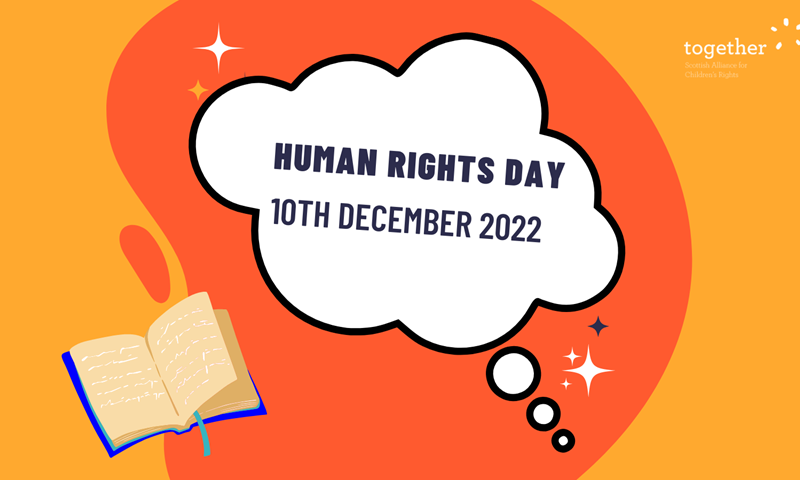Our website uses Cookies - by using this site or closing this message you're agreeing to our Terms & Conditions, Cookie Policy and Privacy Policy
xInternational Human Rights Day: New research on the incorporation of ICERD for Scotland's new Human Rights Bill
Date: 9th December 2022
Category:
UN Convention on the Elimination of Discrimination against Women (CEDAW), Incorporation

The theme of this year’s International Human Rights Day is ‘Dignity, Freedom, and Justice for All’ and in celebration of this special day Judi our Policy and Communications Intern shares an insight into her research during her placement with Together during her Human Rights LLM, on incorporating the International Convention on the Elimination of All Forms of Racial Discrimination (ICERD) and advocates for better access to justice for children and young people in Scotland.
The international standards of ‘dignity, freedom and justice for all’, celebrated this International Human Rights Day, are currently under threat in the UK. The threatened repeal of the Human Rights Act, which incorporates the rights set out in the European Convention on Human Rights, places these internationally recognised rights in UK domestic law at risk. The Scottish Government however, wants to pave its own way in ensuring its legislative framework embodies and maintains these international values.
The Scottish Government has committed to incorporating various United Nations treaties in a new Human Rights Bill, including the International Convention on the Elimination of Racial Discrimination (ICERD), to commit to the reduction of inequality and the enjoyment of human rights for everyone. Children and young people of ethnic minority groups in Scotland face structural and intersectional discrimination which pose multiple barriers to accessing their rights. Since being historically left out of major policy and legislative decisions, they are at increased risk of having their rights violated. Children and young people of ethnic minorities must be considered at this early and vital stage of drafting of this significant legislation if they are to enjoy the benefits of ‘making rights real’ and ‘justiciable’ that incorporation of human rights into Scots law promises.
However, Scotland will be one of few states to directly incorporate ICERD into domestic law, and a gap in research on comparative best practice of state responses to claims of racial discrimination in relation to children and young people means that further exploration of the use of ICERD and its protections against racial discrimination is needed in order to make the most robust Bill possible.
This dissertation aims to make a start at addressing this gap through a comparison of three states which have (somewhat) directly incorporated ICERD into domestic law: Australia, Norway and Aotearoa New Zealand. It presents how they have approached incorporation and analyses how it successfully, or rather unsuccessfully, provides access to justice for children and young people who have experienced racial discrimination. These successes and pitfalls are explored from three different aspects which according to international guidance must be designed appropriately in order to achieve accessible and child friendly administrative justice for all children and young people. These are access to competent (courts and) tribunals, types of remedies and redress, and dispute resolution methods.
The aim of this study is to draw learning for Scotland’s incorporation of ICERD and from its findings concludes with four recommendations for the Advisory Group of the New Human Rights Bill:
- To ensure full and direct incorporation of ICERD, in so far as the powers of the Scottish Parliament will allow.
This would allow a wide scope of the definition of racism articulated in Article 1 of ICERD to be maintained and would promote strict adherence and compliance.
- Include an interpretive clause that gives weight to treaty body General Comments and wider international human rights jurisprudence.
ICERD must be used as it was intended and designed, working as part of the wider UN treaty body system as a ‘living instrument’. Incorporation must include interpretation of its significant accompanying documents, general comments and concluding observations, to remain up to date and relevant.
- Include a requirement for statutory guidance that promotes access to legal remedies, including promoting public awareness of access to remedies especially amongst children.
The new Human Rights Bill must be accompanied by a robust and detailed code of practice or statutory guidance to show how the administrative justice system will work.
- Creation of a children’s administrative justice tribunal.
While Scotland plans to incorporate the UNCRC (Scotland) Bill and ICERD, bringing added specific protection to children and young people of ethnic minorities, despite this when accessing justice, children and young people, especially those of minority groups, may continue to fall through the cracks as often the selected states in this study have shown. This is due to an administrative justice system which has simply been designed by and for adults which may never bend appropriately enough to fit the specific needs of children.
Access to justice is an important and vital remedial measure when it comes to the implementation and protection of human rights, however this research also recognises that preventative measures to racial discrimination must also be in place to ensure children and young people of ethnic minorities do not face discrimination in the first instance. It is a progressive commitment the Scottish Government has made, to become a world leader in human rights and to make rights real for everyone, but the reality can be much bleaker for children and young people of ethnic minorities. Too many still experience overt and covert forms of racism and some civil society organisations fear that incorporation of ICERD will not bring about a culture change. While Scotland’s plans to incorporate international human rights treaties into domestic law is a pioneering and righteous decision, we must make sure that Scotland has earned these bragging rights as an aspiring ‘world leader in human rights’. At the bare minimum, a robust and effective administrative justice system that is child-friendly and accessible, must be established with the new Human Rights Bill.
